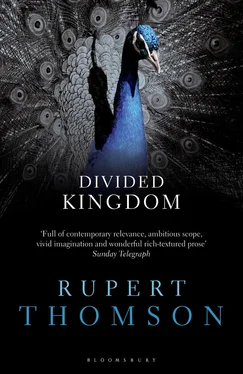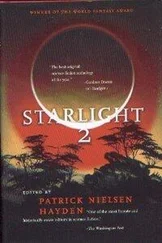‘I don’t know what to do,’ he said after a while. ‘I feel so hopeless.’
Outside, a bitter wind scoured the cracked concrete where the petrol pumps stood. Ice had formed on the puddles, as fragile and transparent as a layer of skin. She bled the radiators with a small grey key. They groaned and clanked a little, but the room didn’t seem to get much warmer.
Later that night Luke asked if he could stay. When she hesitated, he told her not to worry. He’d be gone in the morning. It was strange how he could still wound her, how words like that made her heart hurt.
‘Yes,’ she said. ‘All right.’
‘Do you want me to sleep in the chair?’ he said. ‘I’ll sleep in the chair, if you like.’
‘You’ll freeze,’ she said.
He climbed beneath the blankets. His body smelled of nutmeg, the way it always used to. She knew she shouldn’t have slept with him, but she did it anyway. She hadn’t been doing it for him. She’d done it for herself.
No one ever bothers to imagine how alone other people are.
It was almost dawn before she noticed that the grey-blue vapour she’d once coveted had disappeared. Turning in the bed, she looked straight at him. She saw how the surface of his skin fluttered, and how he brushed constantly at phantoms with his hands. From his lips came whimpered protests and entreaties. He had become as phlegmatics were supposed to be — tremulous, inert — but unlike most of them he had nothing to fall back on.
In the early morning they stood near the car-wash, the big blue brushes foolish, incongruous, like someone’s idea of a joke, and she knew this was the last time she would ever see him. The tears ran from her eyes. She had lost him, but that wasn’t really why she was crying. She was grieving for all the things that don’t come again. She was grieving because things end, and she wished they didn’t have to.
He put a hand on her shoulder, then turned and walked across the buckled forecourt, his whole body hunched against the cold. Though her tears had given him a kind of strength, he looked unequal to his surroundings; he had the air of a man who was about to be crushed by the weight of his own existence. At that moment, miraculously, a bus appeared on the road. Luke broke into the semblance of a run, waving an arm, but the bus passed smoothly by, and it was then, as his arm dropped back, that she climbed the steps to her front door and went inside.
Odell was picking at the edge of the hotel blanket. In the distance a siren swooped, then hiccuped. ‘What do you think?’ she said.
I looked up at her. I didn’t see it as a love story, despite the way it had begun. No, I saw it as more of a cautionary tale. The special substance that makes each one of us unique is finite, ethereal. It can be whittled away, almost without us knowing. It can be used up altogether. I had been so many different people during the past few weeks, and, in the end, I had been nobody at all. Odell knew that, and she was using stories from her life to try and bring me back. She wanted to return me to myself, but slowly, gently. In my own time.
‘You think it’s sad,’ she said.
I nodded.
‘Who for? For me?’
For him , I said inside my head.
‘That’s right,’ she said quietly, looking out across the room.
Later, as I drifted on the edge of sleep, I heard her speak again.
‘Yes,’ she said. ‘That’s what I think too.’
The sky was ash smeared on silver where the sun was coming up. The pavements and gutters glittered with crushed beer cans and broken glass. Sunday. The city had a stunned feel to it — the temporary numbness of a dead leg. I wondered idly who had won the game. I never did find out.
We left the hotel early, just after seven, the girl on reception smothering a yawn as she handed us a copy of the bill. Most people would stay in bed until mid-morning, Odell told me, sleeping off their hangovers. It was a good day to be travelling. We bought bacon sandwiches and cups of tea from a café near the station, then set off along a main road that led south. I kept my face twisted into a permanent scowl and chewed sullenly on a wad of gum. I was thinking of my brief stay in Athanor, and how my cuts and bruises had protected me. If I looked dangerous enough, I’d be safe. That was the theory, anyway.
The bars were still open. Every once in a while, a drunk would stagger towards us, hands aloft and twitching in some mad semaphore, but we automatically crossed the road before any of them got close. Their curses reached us like the light from distant stars — faint messages from a world already superseded, left behind. We no longer needed to look at each other, Odell and I. We had a kind of understanding now. I swept my eyes from side to side, constantly aware of my environment. At the same time I walked through it all as though none of it could touch me.
By dusk my lungs felt tight with the exhaust fumes I had been forced to breathe, and my feet ached from walking on nothing but paving-stones and tarmac for hour after hour, and I let out a sigh when Odell, who seemed tireless, finally announced that we’d be stopping for the night.
She had chosen a place called the Hot Hotel, the word Hot glowing on and off like brake lights in a traffic-jam. To reach reception, which was located one floor up, we had to walk down an alley that ran along one side of the building. We were given a room on the third floor, with a circular bed and an orange shag-pile carpet. It had the atmosphere of somewhere that was rented by the hour, and if I turned my head fast enough I seemed to glimpse the shady outlines of those who had preceded us. Access to the room was from an open-air walkway or corridor. I leaned on the parapet, looking out over an all-night service station and a supermarket car-park. Opposite the service station I could see a strip club called the Tinder Box. Sometimes I wanted to question the wisdom of Odell’s decisions, but I wasn’t sure I had the right. Maybe she had been drawn by the number of people around, which would lend us a certain anonymity. She had already saved me once, I thought. Probably I should have more faith in her.
In fact, she had saved me a second time that afternoon. We had been walking along a main road, its four lanes packed with cars. To our left, some fifty feet below us, lay a river, its waters viscous, thick as soup. At one point, Odell had spotted a public toilet. It was in a shopping centre on the other side of the road. She told me to wait. She’d only be a moment. No sooner had she disappeared than I sensed something close by, a kind of force or pressure. Half turning, I saw a boy’s face on a level with my elbow, his eyes dark-brown and startled-looking, his teeth bared. Then my arm jerked backwards and the bag with my white clothes in it was gone. At the same time I felt hands reaching into all my pockets. I swung round. A dozen children swarmed on the pavement behind me, some as young as five or six. The boy who had snatched my bag was making off down a steep slope to the river. The others followed.
For a few seconds I saw the world as if through soundproof glass.
A concrete landscape. Sky creamy with pollution.
Then the sounds flowed back — the rush of traffic, the roar of yet another unknown city — and I was running towards the river. At the water’s edge the boys had already spread the contents of my bag out on the ground. Without thinking, I swooped down and took hold of the bag, together with my cloak, my long johns and my undershirt, then started up the slope again. The boys came after me, their voices shrill and jagged. Somehow I was aware of the smallness of the hands that pushed and pulled at me. Since I was clutching my possessions, though, I was powerless to defend myself. As I regained the pavement I saw Odell threading her way through the traffic towards me. She produced an aerosol and sprayed something into the faces of the two boys who were nearest. They doubled over, howling, hands pressed against their eyes. The other boys fell back. They watched us for a while from a distance, as though contemplating a second assault, and then turned reluctantly away. They would find richer pickings elsewhere, perhaps. Or less resistance. I began to tremble uncontrollably. ‘You were lucky not to get hurt,’ Odell told me. ‘Those gangs of kids, they often carry knives — or guns.’ She gave me a hard, steady look. ‘Next time, let it go.’ Later, she relaxed and smiled. ‘Next time,’ she said, ‘I suppose I’ll have to take you with me.’
Читать дальше












